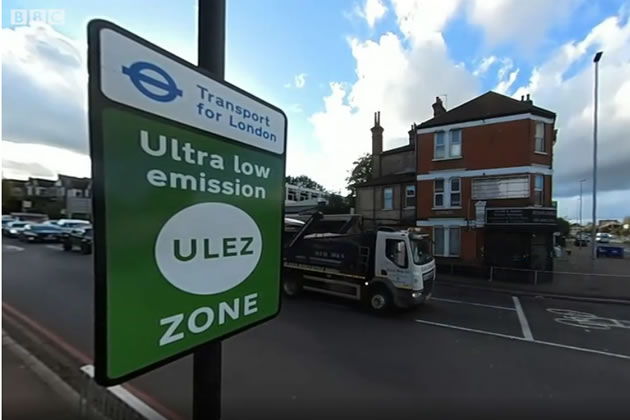Calls Made for ULEZ To Be Extended To Improve Air Quality
New figures show that pollution falling more slowly in outer London

Scheme currently ends at the North and South Circular Roads
January 28, 2022
The mother of a nine-year-old girl who died as a result of air pollution has said that the problem “is dramatically worse” in London almost a decade on from her daughter’s death.
Ella Adoo-Kissi-Debrah, who lived close to the South Circular Road in Lewisham, became the first person in the UK to have air pollution listed as a cause of death following a court case in 2020.
Ella’s mother Rosamund Adoo-Kissi-Debrah, who has tirelessly campaigned for improvements to air quality in London, was a guest speaker at a meeting of the London Assembly’s environment committee on Thursday (27 January).
Discussing the issue of increasing traffic and congestion in London, Ms Adoo-Kissi-Debrah said that “we have actually made this situation even worse”, adding, “shame on us”.
She said, “As I walked [Ella’s] siblings to the cemetery we actually stopped for a moment and looked at the South Circular. This was at about 10 o’clock. It was absolutely gridlocked. Nothing was moving. When my daughter was alive it wasn’t even that bad, so things have got dramatically worse, and especially in the last two years.
“The only thing I said to them – and they looked at me with puppy eyes – is ‘you’re going to have to go back to court to make sure something is done about this’.”
She added that the Mayor of London was part of the inquest into Ella’s death and is “well aware of what actually needs to be done” and that “ULEZ being London-wide was something the experts actually recommended”.
The Ultra-Low Emission Zone was expanded to cover the areas up to, but not including, the north and south circular roads in October last year.
Elliot Treharne, City Hall’s head of air quality, told the London Assembly that the expansion of the ULEZ has led to “benefits across London” in terms of improvements to air quality, but that “there is further action that is needed”.
Earlier this month, Sadiq Khan revealed radical plans to introduce a “clean air charge” that could see drivers pay up to £2 a day to drive a petrol or diesel car in London, as well as potential plans to expand the ULEZ to cover the entirety of Greater London.
The announcement came following research that showed car journeys in London needed to be reduced by 27 per cent by 2030 if the capital is to achieve net zero.
City Hall on Thursday published figures from Imperial College London that showed that air pollution was falling more slowly in outer London than in central London, while outer London also had more deaths that could be attributed to poor air quality.
Sadiq Khan said that he is “not willing to put off action” to tackle air pollution despite it being “politically inconvenient” and that he is “determined that we continue to be doers, not delayers”.
He said, “Air pollution still remains a major public health challenge and I’m not willing to stand by and wait when there’s more we can do in outer London that could make a big difference. We simply don’t have time to waste, there is still far too much toxic air pollution permanently damaging the lungs of young Londoners and affecting older people who are more vulnerable to the impacts of air pollution.
“This is also a matter of social justice – with air pollution hitting the poorest communities the hardest. Londoners on lower incomes are more likely to live in areas of the city most badly affected by air pollution and are least likely to own a car. Nearly half of Londoners don’t own a car, but they are disproportionally feeling the damaging consequences polluting vehicles are causing.”
Like Reading Articles Like This? Help Us Produce More This site remains committed to providing local community news and public interest journalism. Articles such as the one above are integral to what we do. We aim to feature as much as possible on local societies, charities based in the area, fundraising efforts by residents, community-based initiatives and even helping people find missing pets. We’ve always done that and won’t be changing, in fact we’d like to do more. However, the readership that these stories generates is often below that needed to cover the cost of producing them. Our financial resources are limited and the local media environment is intensely competitive so there is a constraint on what we can do. We are therefore asking our readers to consider offering financial support to these efforts. Any money given will help support community and public interest news and the expansion of our coverage in this area. A suggested monthly payment is £8 but we would be grateful for any amount for instance if you think this site offers the equivalent value of a subscription to a daily printed newspaper you may wish to consider £20 per month. If neither of these amounts is suitable for you then contact info@neighbournet.com and we can set up an alternative. All payments are made through a secure web site. One-off donations are also appreciated. Choose The Amount You Wish To Contribute. If you do support us in this way we’d be interested to hear what kind of articles you would like to see more of on the site – send your suggestions to the editor. For businesses we offer the ch
August 16, 2023
. For £30 plus VAT per month you will be the designated sponsor of at least one article a month with your logo appearing if supplied. If there is a specific community group or initiative you’d like to support we can make sure your sponsorship is featured on related content for a one off payment of £50 plus VAT. All payments are made through a secure web site. |